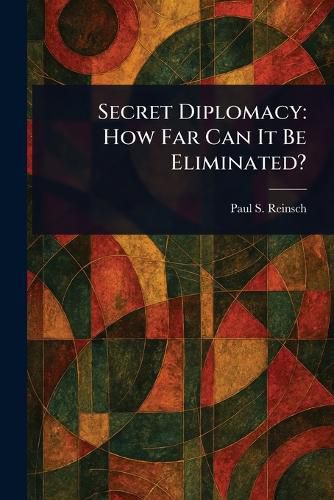Readings Newsletter
Become a Readings Member to make your shopping experience even easier.
Sign in or sign up for free!
You’re not far away from qualifying for FREE standard shipping within Australia
You’ve qualified for FREE standard shipping within Australia
The cart is loading…






This title is printed to order. This book may have been self-published. If so, we cannot guarantee the quality of the content. In the main most books will have gone through the editing process however some may not. We therefore suggest that you be aware of this before ordering this book. If in doubt check either the author or publisher’s details as we are unable to accept any returns unless they are faulty. Please contact us if you have any questions.
Explore the intricate world of international relations with Paul S. Reinsch's "Secret Diplomacy: How Far Can It Be Eliminated?" This seminal work delves into the complexities of diplomacy, examining the role of foreign policy and treaties in shaping global events. Reinsch, a respected voice in the field, analyzes the historical implications of secret diplomacy and its impact on international relations.
Addressing questions of public policy and the ethical considerations surrounding "open covenants," this book offers a critical perspective on the practice of diplomacy as it existed in the early 20th century. A vital resource for anyone interested in the history of diplomacy and its ongoing relevance to contemporary political science. This carefully prepared print edition ensures that Reinsch's insightful analysis remains accessible to students, scholars, and anyone seeking a deeper understanding of the forces that shape our world.
This work has been selected by scholars as being culturally important, and is part of the knowledge base of civilization as we know it.
This work is in the public domain in the United States of America, and possibly other nations. Within the United States, you may freely copy and distribute this work, as no entity (individual or corporate) has a copyright on the body of the work.
Scholars believe, and we concur, that this work is important enough to be preserved, reproduced, and made generally available to the public. We appreciate your support of the preservation process, and thank you for being an important part of keeping this knowledge alive and relevant.
$9.00 standard shipping within Australia
FREE standard shipping within Australia for orders over $100.00
Express & International shipping calculated at checkout
This title is printed to order. This book may have been self-published. If so, we cannot guarantee the quality of the content. In the main most books will have gone through the editing process however some may not. We therefore suggest that you be aware of this before ordering this book. If in doubt check either the author or publisher’s details as we are unable to accept any returns unless they are faulty. Please contact us if you have any questions.
Explore the intricate world of international relations with Paul S. Reinsch's "Secret Diplomacy: How Far Can It Be Eliminated?" This seminal work delves into the complexities of diplomacy, examining the role of foreign policy and treaties in shaping global events. Reinsch, a respected voice in the field, analyzes the historical implications of secret diplomacy and its impact on international relations.
Addressing questions of public policy and the ethical considerations surrounding "open covenants," this book offers a critical perspective on the practice of diplomacy as it existed in the early 20th century. A vital resource for anyone interested in the history of diplomacy and its ongoing relevance to contemporary political science. This carefully prepared print edition ensures that Reinsch's insightful analysis remains accessible to students, scholars, and anyone seeking a deeper understanding of the forces that shape our world.
This work has been selected by scholars as being culturally important, and is part of the knowledge base of civilization as we know it.
This work is in the public domain in the United States of America, and possibly other nations. Within the United States, you may freely copy and distribute this work, as no entity (individual or corporate) has a copyright on the body of the work.
Scholars believe, and we concur, that this work is important enough to be preserved, reproduced, and made generally available to the public. We appreciate your support of the preservation process, and thank you for being an important part of keeping this knowledge alive and relevant.